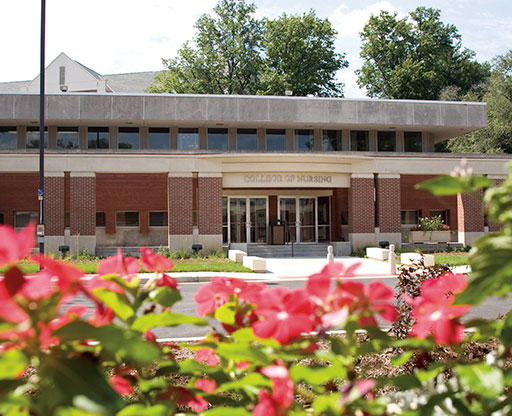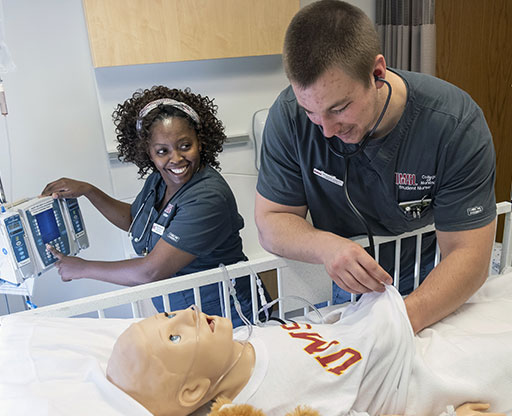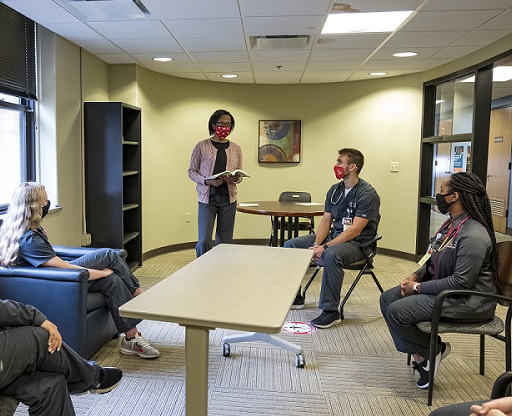Unlock new opportunities with your Doctor of Nursing Practice from the University of Missouri–St. Louis
Advance your career with a future-focused, innovative nursing education from the University of Missouri–St. Louis. Our DNP program prepares you for the highest level of practice, immersing you in experiences the moment you begin your program.
Designed for working professionals, we offer full- and part-time DNP programs to help you reach your full potential as a nurse practitioner on your schedule. Our Doctor of Nursing Practice is fully accredited by the Commission on Collegiate Nursing Education (CCNE) and provides engaging distance-mediated course work through competency-based classes with minimal on-campus visits.
Empowering DNP-prepared nurses for success
Designed for advanced clinicians in direct or indirect roles, our Doctor of Nursing Practice equips you to improve outcomes for patients, families and communities by translating clinical research into practice. Endorsed by the American Association of Colleges of Nursing (2004), our program empowers DNP graduates with innovative education in health policy, organizational leadership and management and clinical expertise focusing on evidence-based practice.
All our courses are offered in a distance learning format, with an on campus three-day intensive experience.
Program type:
Doctorate, DNP
Format:
Online
Take the next step
Request more information below:

Why earn your Doctor of Nursing Practice at UMSL?
Join an empowering and inclusive community of dedicated nurse practitioners and researchers. With UMSL’s DNP program, you’ll foster connections with leading health-care providers in the region to advance your nursing career.
The UMSL College of Nursing dedicates itself to the pursuit of excellence and leadership through academic, clinical and research initiatives:
- Innovative education: Through a thoughtfully designed curriculum and immersive learning experiences, your UMSL Doctor of Nursing Practice degree prepares you to make a lasting impact on health care.
- In-the-know faculty: Every faculty member is a practicing nurse practitioner with insights into current practice protocols, guidelines and implementation changes.
- Foster personal connections: We’ll partner you with a faculty mentor at the beginning of your studies, ensuring your success at every step of your journey.
DNP career outlook
Prepare for the highest level of practice with UMSL. Our DNP program empowers you to succeed in a fast-growing industry, unlocking a variety of career opportunities in nursing.
DNP graduates excel in advanced nursing roles like nurse practitioners and nurse anesthetists, delivering top-tier patient care. They also thrive in health-care leadership, education, research, policy, advocacy and consulting roles. With DNP credentials, graduates rapidly advance in their health-care careers.
According to the U.S. Bureau of Labor Statistics, nurse practitioners rank #2 among the fastest-growing careers, with a projected 38 percent increase in DNP career opportunities through 2032. With a median annual salary of $125,900, UMSL DNP graduates are at the forefront of health care and leadership.
The median annual salary for Nurse Practitioners is $125,900 according to wage and employment data from the U.S. Bureau of Labor Statistics.
125,900
38
Admission and Degree Information
The UMSL College of Nursing participates in Nursing’s Centralized Application Service (NursingCAS) online application system. NursingCAS collects and processes your application documents and verifies your transcripts. We receive your application information from NursingCAS and use it to make our admission decisions.
Application Deadline
Only complete applications with all required documents (official transcripts, letters of recommendation, essay, etc.) are reviewed for admission.
The priority deadline for receipt of all admission materials is January 15 of each year for the following fall admission. After January 15, rolling admissions will occur until class is full or by July 31st, whichever comes first. The BSN- and MSN-DNP programs currently offer a fall start only. Notification of acceptance to the DNP program occurs in March for applications received by the priority deadline. Notification of acceptance occurs within four weeks during the rolling admission period.
A required DNP program orientation is held Thursday and Friday the week prior to the first day of fall term.
Plan of study
Review Full Degree Requirements Download Admission Requirements
BSN to DNP Emphasis Areas
BSN to Doctor of Nurse Practitioner degree students choose a nurse practitioner population of focus for their studies or the leadership in health-care systems focus. DNP program students will put evidence into practice and measure the outcomes through the completion of a clinical scholarship project in their final year.
 The role of the AGNP is to provide primary care to adults from youth (14-years of age) through geriatrics with an in-depth knowledge and experience in the primary health care needs for well-person care and the prevention/management of common adult acute illnesses and chronic conditions. This primary care is provided to support the optimal health of adults within the context of their family, community, and environmental setting. Although AGNPs practice primarily in private practices and ambulatory clinics, their scope of practice may also extend into the residential care and inpatient settings and is based upon the needs of the patient.
The role of the AGNP is to provide primary care to adults from youth (14-years of age) through geriatrics with an in-depth knowledge and experience in the primary health care needs for well-person care and the prevention/management of common adult acute illnesses and chronic conditions. This primary care is provided to support the optimal health of adults within the context of their family, community, and environmental setting. Although AGNPs practice primarily in private practices and ambulatory clinics, their scope of practice may also extend into the residential care and inpatient settings and is based upon the needs of the patient.
Plan of study
Plan of study
The graduate of an FNP program is prepared to provide primary care for individuals and families across the lifespan. The FNP role includes preventative healthcare, as well as the assessment, diagnosis and treatment of acute and chronic illness and preventative health care for individuals and families. Family nurse practitioners demonstrate a commitment to family –centered care and understand the relevance of the family’s identified community in the delivery of family- centered care. (AACN, 2013)
Plan of study
| Diagnosis and Management Foundations | ||
| NURSE 6723 | Foundations of Pediatric Health | 3 |
| Diagnosis and Management I | ||
| NURSE 6739 | Adult Health I |
4 |
| Diagnosis and Management II | ||
| NURSE 6740 | Adult Health II |
4 |
Total Hours |
11 |
The role of the PNP-PC is to provide primary care to children from birth through young adult with an in-depth knowledge and experience in pediatric primary health care including well child care and prevention/management of common pediatric acute illnesses and chronic conditions. This care is provided to support optimal health of children within the context of their family, community, and environmental setting. Although PNP-PC practice primarily in private practices and ambulatory clinics, their scope of practice may also extend into the inpatient setting and is based upon the needs of the patient. (AACN, 2013)
Plan of study
A graduate of the PNP-AC program is prepared to care for children with complex acute, critical and chronic illness across the entire pediatric age spectrum, from birth to young adulthood. Circumstances may exist in which a patient, by virtue of age, could fall outside the traditionally defined PNP-AC population but by virtue of special need, the patient is best served by the PNP-AC. The PNP-AC implements the full scope of the role through assessment, diagnosis and management with interventions for patients and their families. The PNP-AC provides care to patients who are characterized as “physiologically unstable, technologically dependent, and/or are highly vulnerable to complications” (AACN Scope and Standards, 2006, p 9), and a continuum of care ranging from disease prevention to critical care in order to “stabilize the patient’s condition, prevent complications, restore maximum health and/or provide palliative care” (AACN p. 10). Patients may be encountered across the continuum of care settings and require ongoing monitoring and intervention. (AACN, 2013)
Plan of study
For all Nurse Practitioner emphasis areas, a student must complete both focus content above and specialty courses as listed below.
| Diagnosis and Management Foundations | ||
| NURSE 6723 | Foundations of Pediatric Health | 3 |
| Diagnosis and Management I | ||
| NURSE 6743 | Pediatric Health I: Acute and Chronic Care | 4 |
| Diagnosis and Management II | ||
| NURSE 6745 | Pediatric Health II: Complex Acute Care | 4 |
Total Hours |
11 |
|
The PMHNP focuses on individuals, families, and populations across the lifespan at risk for developing and/or having a diagnosis of psychiatric or mental health conditions. The PHMNP provides mental health care to patients seeking mental health services in a wide range of settings and across all acuity levels. The mental health care provided by the PMHNP involves relationship-based, continuous and comprehensive services, necessary for the promotion of optimal mental health, prevention, and treatment of psychiatric disorders and health maintenance. This includes assessment, diagnosis, and management of psychiatric and mental health conditions across the lifespan using pharmacological, psychotherapeutic, and non-pharmacological treatments. (AACN, 2013)
Plan of study
The WHNP provides primary care to women across the life cycle with emphasis on conditions unique to women from menarche through the remainder of their life cycle within the context of sociocultural environments – interpersonal, family, and community. In providing care, WHNP considers the inter-relationship of gender, social class, culture, ethnicity, sexual orientation, economic status, and socio-political power differentials. (AACN, 2013)
Plan of study
| Diagnosis and Management Foundations | ||
| NURSE 6724 | Foundations of Women’s Health | 3 |
| Diagnosis and Management I | ||
| NURSE 6746 | Women’s Health I | 4 |
| Diagnosis and Management II | ||
| NURSE 6747 | Women’s Health II | 4 |
Total Hours |
11 |
|
Non-Missouri Residents: Prospective students are responsible for reviewing the UMSL state authorizations page to see if this program is offered in their state throughout their program and to review the licensure or certification requirements for the state in which they reside.








